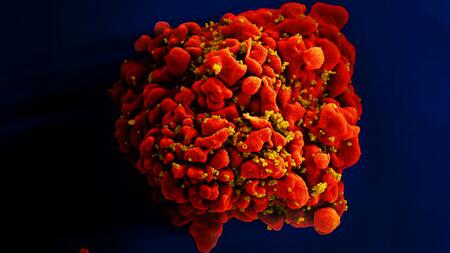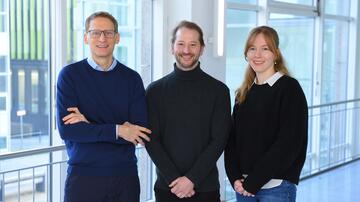Longevity of HIV-neutralising antibodies explored
Important step towards an HIV vaccine
A digitally colourised scanning electron microscopic image of a single, red-coloured T cell infected with numerous spherical, mustard-coloured HIV particles attached to the surface membrane of the cell.
Despite decades of research, there is still no vaccine that protects against HIV infection. It is currently assumed, however, that such a vaccine can only be effective if it also produces so-called neutralising antibodies in the vaccinated person. An international team led by the DZIF scientists Prof. Dr Florian Klein, Director of the Institute of Virology at the University Hospital Cologne, and Dr Dr Philipp Schommers, Head of the Laboratory for Antiviral Immunity at the Department I of Internal Medicine at the University Hospital Cologne, has now investigated the longevity of such antibodies in HIV-infected people for the first time. The findings, published in the renowned journal Nature Medicine, improve our understanding of the dynamics of such antibodies and are an important building block for further research into an HIV vaccine.
“We were able to show that the HIV-1 neutralisation activity in patients strongly depends on the amount of virus in patients,” reports the study’s first author Dr Dr Schommers. “While this dependence could be investigated in other infectious diseases, such as COVID-19, shortly after the initial description of the disease, the longevity of neutralising antibodies in HIV-1 had not yet been shown in large studies.”
Despite effective antiretroviral drugs that form the basis for treating the HIV-1 infection and can effectively prevent the transmission of the virus, over 1.2 million people are infected with HIV every year. Therefore, the development of an effective HIV-1 vaccine is still being intensely researched.
So-called broadly neutralising antibodies (bNAbs) can prevent HIV-1 infection. Researchers are trying to induce such bNAbs through a vaccination in humans. However, this has proven to be extremely difficult. Therefore, vaccines that allow the formation of bNAbs in humans have not yet been developed. It is also unclear how long such broadly neutralising antibodies remain in humans. However, this knowledge is extremely important in developing successful strategies for an HIV-1 vaccination.
The researchers led by Schommers and Klein have therefore investigated the HIV-1 antibody response in more than 2,300 patients from Germany, Tanzania, Cameroon and Nepal. They were able to identify various factors that cause patients to form neutralising antibodies naturally. In addition, they identified so-called ‘elite neutralisers’, i.e. HIV-1-infected individuals who develop a very potent and broadly neutralising antibody response. By examining HIV-1-infected people over time, the international research team was then able to find out the dynamics with which HIV-1 neutralising antibodies persist or whether their concentration in the blood drops. Here it was shown that although the antibody response in these patients decreases over the years, highly potent bNAbs can still be detectable in them years later. This is an important finding and indicates that a potential HIV-1 vaccine can induce a lasting vaccine response.
Source: Press release of the University of Cologne.




